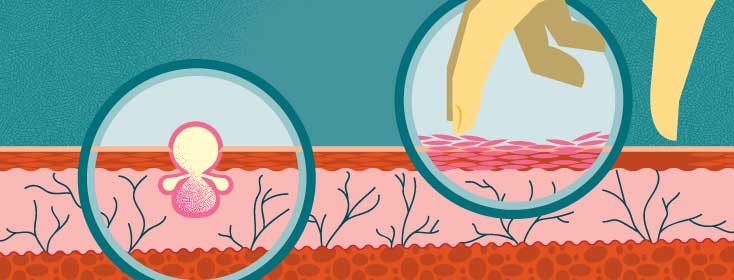Acne or Eczema: How Do You Know?
Acne and eczema are skin conditions that can be uncomfortable, disfiguring and interfere with the quality of your life. How do you know which is which and what you can do about them? See a dermatologist for a physical exam.
It’s that simple. There are no medical tests or scans, no painful procedures to go through. An experienced medical professional can take a thorough personal history and examine the irritated patches on your skin to generally make an accurate diagnosis.
Acne? Eczema?
These two skin conditions are very common and can be stressful; in fact, a contributing cause to both can be stress. They can develop at any age, and can be chronic or intermittent conditions subject to flare-ups. Some find them painful or embarrassing, but neither is contagious.1,2
There are also differences between acne and atopic dermatitis (AD), which is often referred to as eczema, especially in the way they are treated.
Understanding the skin
The skin is the largest organ in the body. It is made up of multiple layers and serves several functions including:
- Provides an exterior covering to the body’s other organs, muscles, and internal structures
- Helps maintain body temperature
- Protects internal layers from germs and water.
Layers
There are 3 basic layers:
- Epidermis is the outer barrier layer. It has sub-layers that each has a specific role in skin growth, replenishment and protection.
- Dermis is the middle working layer. It makes sweat to cool the body, oil to waterproof the skin and provides protective covering for blood vessels that feed the skin.
- Subcutaneous is the deepest, fatty layer. It attaches the multiple skin layers to your muscles and bones. It also plays a role in regulating body temperature.
Acne
Acne results from clogging of the oil glands under the skin. When blockage builds up in the pores on the surface of the skin it can form a bump or pimple. Sometimes these are filled with pus and can be painful and unattractive. Acne tends to appear on the face, neck, back and shoulders.
Flares and triggers
Acne is sometimes thought of as a teen skin condition. But it affects babies and adults as well. It can run in families, be triggered by a medication side effect, or result from stress or hormonal change, and other contributing factors.
Treatment options
A dermatologist can make the diagnosis and treat you with medications to help reduce or resolve the condition. Treatment options include topical ointments and creams, antibiotics and other oral medications, as well as chemical peels and light therapy. Light treatment for acne can take several forms including but not limited to lasers, visible light (red and blue), and infrared.3
Atopic Dermatitis
AD is an autoimmune skin condition affecting nearly 18 million people in the USA. Atopic dermatitis develops as a result of environmental and genetic factors that contribute to a functional change in the skin barrier. An inflammatory response can result in dry skin because of a lack of water and reduced production of fat and oil as compared to a normal skin cell. It can develop anywhere on the body.
Flares and triggers
Eczema can flare up when the skin is dry or exposed to irritants. Stress can be a trigger; as are weather, allergens, and infections. It generally appears on the face and neck of babies and more commonly in the creases of elbows, knees, neck, wrists and ankles of older teens and adults.
It presents in different forms: some patches are red and rough, others are discolored or leathery, some are bumpy, others can ooze or weep. The most common complaint is that eczema is itchy.
Treatment options
There is no cure for AD, but a variety of treatments can ease the discomfort and reduce the symptoms. There are prescription creams, some of which include steroids that can reduce inflammation. Some use antihistamines to reduce itching. Like with acne, some people also benefit from phototherapy, treatment with UV light.
Care
A good home skin care regimen can benefit those who have acne or eczema. Keeping skin clean with gentle washing is important. Remember to leave the affected areas alone, and try not to touch, pick, or scratch. Stay covered when out in the sun. Eliminating or managing stress through relaxation techniques such as mediation or yoga can also be helpful.1

Join the conversation